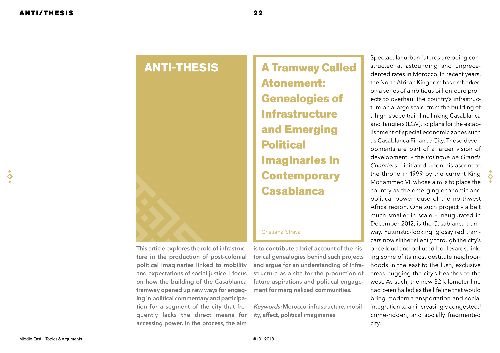A Tramway Called Atonement: Genealogies of Infrastructure and Emerging Political Imaginaries in Contemporary Casablanca
This article explores the role of infrastructure in the production of post-colonial political imaginaries linked to mobility and expectations of social justice. I focus on how the building of the Casablanca tramway opened up new ways for engaging in political commentary and participation for a segme...
I tiakina i:
| I whakaputaina i: | Middle East - Topics & Arguments |
|---|---|
| Kaituhi matua: | |
| Hōputu: | Artikel (Zeitschrift) |
| Reo: | Ingarihi |
| I whakaputaina: |
Philipps-Universität Marburg
2018
|
| Ngā marau: | |
| Urunga tuihono: | Urunga tuihono |
| Ngā Tūtohu: |
Kāore He Tūtohu, Me noho koe te mea tuatahi ki te tūtohu i tēnei pūkete!
|
| Whakarāpopototanga: | This article explores the role of infrastructure in the production of post-colonial political imaginaries linked to mobility and expectations of social justice. I focus on how the building of the Casablanca tramway opened up new ways for engaging in political commentary and participation for a segment of the city that frequently lacks the direct means for accessing power. In the process, the aim is to contribute a brief account of the historical genealogies behind such projects and argue for an understanding of infrastructure as a site for the production of future aspirations and political engagement for marginalized communities. |
|---|---|
| DOI: | 10.17192/meta.2018.10.7590 |
